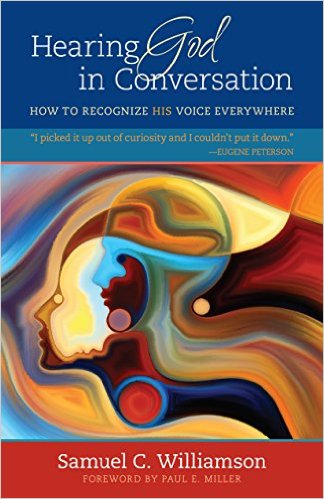|
Hearing God in
Suffering
.
by Sam Williamson
Most of my high school friends were
obsessed with college-prep, extra-curricular
activities, and jobs. Except for one friend. Like
a lion, he could sniff out a wounded schoolmate
from a thousand yards. And like a lamb, he sat
with them in their grief.
One day we heard a lecture on
handling pain. Much of the class was indifferent,
but this one friend listened with fixed attention.
My preppy class asked how to deal with a poor
score on a college-entry exam; he asked how to
cheer a suicidal sibling.
My friend suffered from cerebral palsy. Everyday
his infirmity slapped him in the face, and every
night throbbing muscles threatened his sleep. He
stumbled awkwardly as he walked, his dialog was
often incomprehensible, and his body was wracked
with pain. (All-the-while his mind remained sharp;
he knew what he suffered.)
Classmates overlooked him for team sports; mid-day
waiters insulted him by asking me what “he” wanted
for lunch; and the difficulty of his spastic
speech meant few people invited him for an evening
dinner.
Yet he always sought out others in in their
sorrow. Oswald Chambers once said,
Suffering burns up a lot of
shallowness in a person.
We Hate Suffering
We all know a few of our foibles: we are easily
offended when corrected, we talk more than we
listen, we barely know how to spell “joy” (much
less live it), and we are consumed with
self-doubts, “If only I had said ‘X’ instead
of ‘Y.’”
We wrestle with our anxiety, condescension, and
insensitivity. And they pin us to the mat. We
chase self-improvement, sure, but mostly to avoid
the humiliation of looking stupid, uncaring, and
high-maintenance. Failures drive us to avoid
sorrow at any cost.
We want healing from suffering; but
Scripture says we get healing only through
suffering.
God uses sorrows as spiritual chemotherapy,
poisoning cancerous cells so that healthy cells
can thrive. “He delivers the afflicted by their
affliction and opens their ear by adversity” (Job
36:15).
We hate passages like that.
To Live a Dying Life
Jesus was a man of sorrows. To follow Jesus is a
walk of sorrows. Through suffering, we meet God.
The way of Jesus is the road to Calvary, planting
daily our crosses; as little by little the
cancerous cells perish, and as little by little
his life in us takes root. In our sorrows, we
begin to discover true joy.
Each new sunrise screams of brutalities, ethnic
cleansing, sexual carnage, heartbreaking divorce,
rejection, and loneliness.
What kind of God do we want? A God indifferent to
suffering, exempt and untouched? Or a God so moved
with compassion at the slaughter of his people
that he enters creation to absorb into himself the
anguish of a heartbroken world?
The way of Jesus is to live a dying life.
God’s Voice in Our Affliction
Experiences of loneliness and pain leave us
feeling barren and empty, joyless and wasted; but
it is precisely in times of wounded-ness that God
speaks to us:
The other gods were strong; but Thou
wast weak;
They rode, but Thou didst stumble to a throne;
But to our wounds only God’s wounds can speak,
And not a god has wounds, but Thou alone.
- Edward Shillito
Rather than flee agonies, let’s seek his voice in
the heartbreaks of our sorrows:
- If we are rejected, hear him whisper that he
was discarded so we can be cherished;
- In our loneliness, hear his pledge that he
was forgotten so we will be treasured;
- In the aches of our withering bodies, hear
his shout that we are nearly home.
The same sun that hardens clay also softens wax.
Which will we be? Will the sufferings of life turn
us callous and harsh, or will we let the
blood-soaked lashes of Jesus speak to our wounds?
Like my high school friend, let us stumble
awkwardly into a world of anguish, anointing the
griefs of others with the balm of a wounded God.
Let us live a dying life.
Sam

Sam Williamson has published
numerous articles and has written two books.
He has a blog site, www.beliefsoftheheart.com,
and can be reached at
Sam@BeliefsoftheHeart.com.
Hearing
God in Conversation: How to Recognize
His Voice Everywhere, by Samuel C.
Williamson, published by Kregel
Publications, 2016, available from Amazon
photo
of
|

